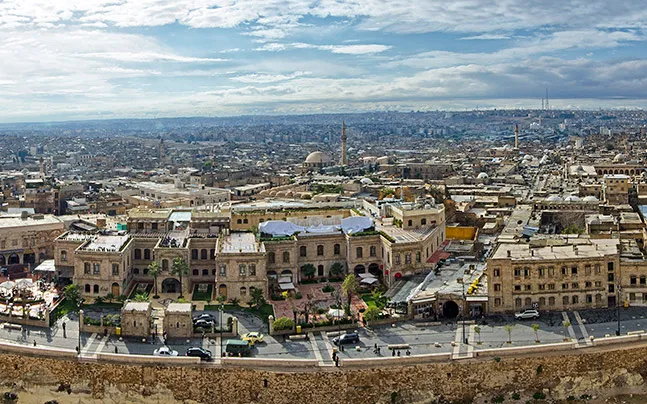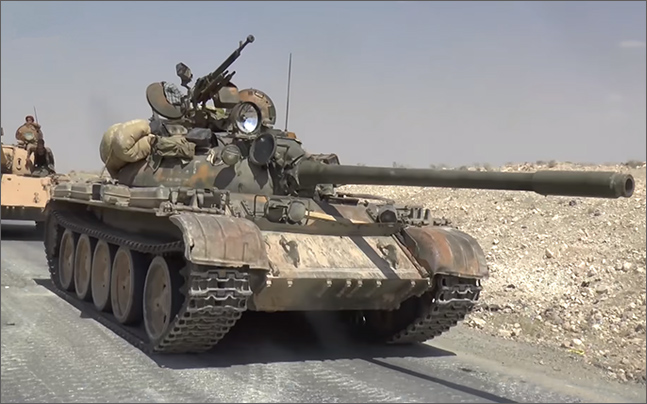
Aleppo, Syria’s ‘second city’, in the news today for being the most violent urban establishment on the planet was not always so. It is the place where noted British author Agatha Christie wrote parts of her famous novel ‘Murder on The Orient Express’, and home to the famous The Baron Hotel where the likes of French President Charles De Gaulle rubbed elbows with the Syrian establishment and elites.
Today, the famed city with its civilization traceable as far back as 5,000 years is in tatters. Aleppo has become the scene of possibly the most intense battle in the now more than half-a-decade long running civil war, with the Syrian ‘opposition’, predominantly made up of Sunni militias, that formulated and mobilized against the government of Syrian President Bashar al-Assad during the anti-government movements in the Arab world, or what we now more famously know as the ‘Arab Spring’. The opposition loosely organized under one umbrella is known as the Free Syrian Army (FSA).
 Syrian Army T-55s | Source: Wikipedia
Syrian Army T-55s | Source: Wikipedia
It is safe to say today that the Syrian conflict has entered a phase of despair where the conflict seems to have no viable end in sight. The number of players in the Syria crisis has increased, and so have the very definitions of the parties involved, what their motives are and what end games they have in mind individually. To put it in simple terms, the opposition movement against Assad is a highly fractured one, which in itself is a recipe for disaster. The opposition consists of various factions and interest groups, many of whom are either directly or indirectly affiliated to terror organizations such as Al Qaeda. The complexity of the Syrian crisis, as it stands today, is a jigsaw in itself to understand. While Assad is being propped up by the Russian and Iranian regimes, many of the opposition groups, which include the likes of the so-called Islamic State (ISIS) and the powerful Jabhat Fatah al-Sham (formerly known as Jabhat al-Nusra or the Jabhat al-Nusra Front) along with several other smaller groups are determined to dethrone the Assad regime. Amongst these are also the Kurds, who are not only fighting off Assad and ISIS together, but also have another battlefront open with Turkey as they also fight a battle for their own, independent state.
However, the JFS is perhaps the most powerful entity against the Assad regime in Aleppo. Despite other groups present, JSF, which only recently publicly announced its separation from Al Qaeda, forms a big portion of what the opposition is, that is a large section of it being Islamists, and along with ISIS, not offering any viable alternative to a post-Assad future of not just Aleppo, but Syria itself.
The disbanding and renaming of the Nusra Front has seemingly not soured relations between its powerful leader Abu Mohammed al-Golani and the Al Qaeda chief Ayman al-Zawahri. The Al Qaeda leader, in response to the Nusra Front going its own way as the JSF had said in an audio message that “the brotherhood of Islam…is stronger than any organizational links.” Al Qaeda’s second in command, Ahmed Hassan Abu al-Khayr also gave al-Golani his blessing, stating that the group should “go ahead with what protects the interests of Islam and Muslims and what protects jihad”.
The battle of Aleppo has now escalated to not just a must-win situation for both Assad and the rebels, but a show of strength and face for the likes of Russia and Iran as well. Moscow last month sent its ailing and only aircraft carrier, Admiral Kuznetsov, to the Mediterranean sea off the coast of Syria to launch strikes on Aleppo using the ship’s fleet of Sukhoi 33 Flanker-D and MiG 29K fighter jets. Meanwhile, Iran has been playing a more covert and shadowy role in Aleppo, with pictures of Major General Qassem Suleimani, commander of the Iranian Revolutionary Guard’s (IRGC) elite extraterritorial wing, known as the Quds Force, managing operations in Aleppo surfacing.
Currently, the people of Aleppo are being bombarded from both fronts. As the international community sits on the sidelines hopelessly, Russia, Turkey and Iran have managed to develop their own new order in the region, and orchestrated a ceasefire to allow civilians to leave the city. The United States, over the past month or more, has become a scarce entity and voice in the Syrian conflict with Tehran, Moscow and Ankara taking over the reigns. Over the past week, a ceasefire, held on by a thread, has been attempted in order to allow aid agencies to deliver critical supplies to the besieged population and evacuating the injured. However, both sides have reportedly continued to flout the no-firing understanding.
Overall, the Assad regime has made steadfast progress against the rebels in Aleppo. As part of a ceasefire deal, the regime has allowed rebel fronts to leave the city via safe passages in hope to gain full control of eastern Aleppo.
The rebels have attacked buses being brought in from other cities to vacate civilians and those injured, while using these transport corridors to move their own families and themselves out first and foremost. According to monitors on the ground in Aleppo, the rebels torched buses headed to towns such as Al Fu’ah and Kafria, which are dominated by Shiia populations. As part of the ceasefire, with Iran wielding its influence on the ground, Shiias in the region were also given space in the evacuation deal. However, around Al Fu’ah and Kafria in Syria’s Idlib governorate, the region has predominantly been under two main militant outfits, the JSF and the salafist jihadi group Jund al-Aqsa.
The Assad regime is close to gaining an unchallenged control over Aleppo, a city that is now nothing but rubble and death with thousands dead, and even more left homeless.
…and understanding the world’s biggest democracy on the Syrian war
India’s response to the Syrian crisis has been ambiguous at best. However, as it is common in diplomacy, New Delhi’s stance has slants visible in reading between the lines. India has given its backing to the Russian air campaign in Syria and to Assad’s view that equates rebel groups to terrorists, and pushed for a UN-led peace solution all at the same time. India has had historically good relations with Syria and Assad, and to understand this, it has two main points of interest that drive its viewpoint regarding the Syrian civil war. First, as New Delhi continues to say that no military solution can be possible, it has also backed the Russian and Assad regime over their military campaigns under the Indian stance of not differentiating between ‘good and bad terrorists’, one that emits from its own experiences at home, and in effect is an extension of its domestic policies. Last year, India’s then-Secretary (East) at the Ministry of External Affairs Anil Wadhwa had said: “…the Indian position is that the Russian involvement in Syria is to halt the advances of the Islamic State”.
Secondly, India has vehemently opposed Western interventionist policies to solve crisis in such areas of conflict. Highlighting the example of Libya, where the poorly orchestrated ouster of the then Libyan despot Muammar Gaddafi has left the country in tatters, with a political vacuum that has allowed entities such as ISIS to make presence. Throughout the Syrian conflict, India has maintained an embassy in Damascus and there have been healthy diplomatic exchanges this year itself. Syria’s Deputy Prime Minister (and Foreign Minister) Walid Muallem visited New Delhi in January, with India’s Minister of State for External Affairs MJ Akbar reciprocating with a visit to Damascus in August as part of his three nation visit (other two were Iraq and Lebanon) to the region.
India’s former Ambassador to Syria, VP Haran, in an obscure interview earlier this year had said that the conflict was largely instigated by outside powers, specifically pointing towards the Gulf states and the collusion between them, the US and Al Qaeda. On Aleppo, Haran said that the city was largely calm and that bothered the opposition. “The opposition could not force people in Aleppo to revolt against the regime, so they sent their own people. These people then burned something on the streets and went back. But journalists reported about that by saying that these were Aleppo people who took part in the revolt”.
In its latest views on Aleppo, the MEA’s spokesperson has offered a contradictory, fence-sitting statement on the crisis. The comment read: “India will welcome any reduction in violence and cessation of hostilities. Protection of civilians should be priority number one. We have always stood for Syria’s territorial integrity. At the same time, selective approaches to dealing with terrorist groups have had negative effect as has been proved around the world. There can be no military solution to the conflict and the focus should be on an inclusive Syrian-led political dialogue.”
Oddly, India’s latest views on the crisis are self-contradictory and attempt to hide behind the pervasions of diplomatic language. While India says it has always stood for Syria’s “territorial integrity”, it also maintains that there can be “no military solution” to the crisis. In effect, India seems to be propagating both the Assad regime doing what is necessary to protect its government and the Syrian state, as we know of today from jihadists, while also suggesting that military operations will not offer a solution conflict. Both these views, along with New Delhi’s opposition to the ‘good terrorist bad terrorist’ argument, presented by India are contradictory, unrealistic and self-defeating in both diplomatic posturing on a globally significant crisis and the moral responsibilities for the world’s largest democracy on the brutish realities of the Syrian conflict.
Understanding the battle of Mosul and the impending ‘demise’ of the Islamic State
The views expressed above belong to the author(s). ORF research and analyses now available on Telegram! Click here to access our curated content — blogs, longforms and interviews.




 Syrian Army T-55s | Source: Wikipedia
Syrian Army T-55s | Source: Wikipedia PREV
PREV



